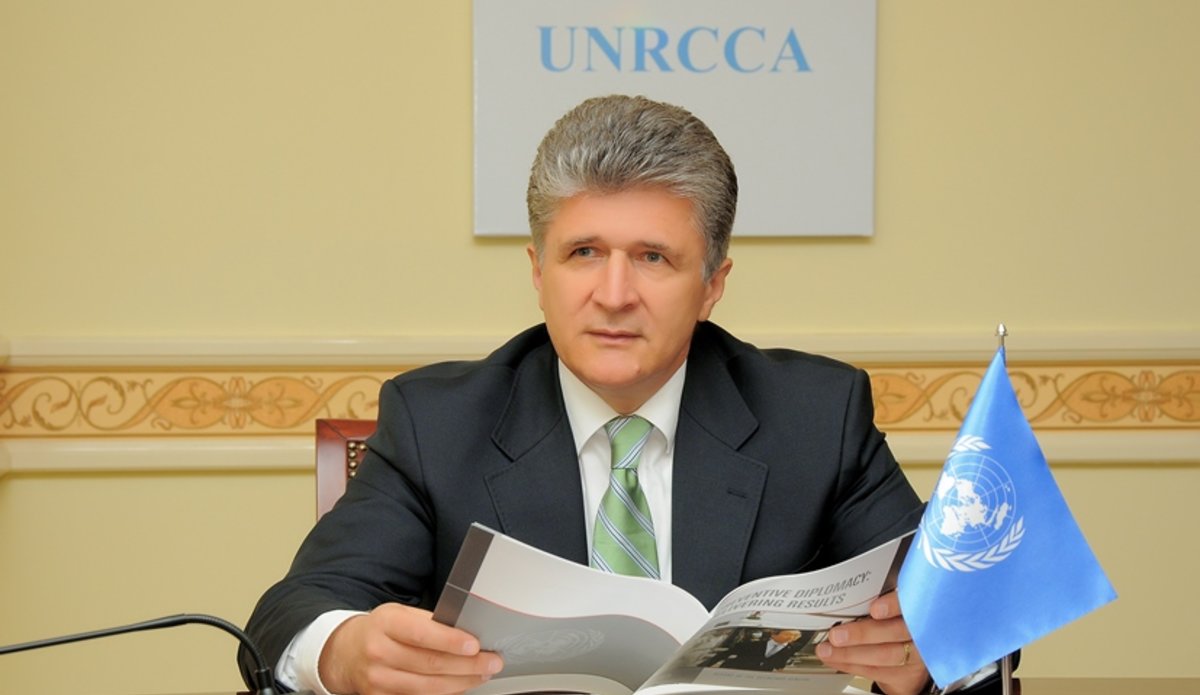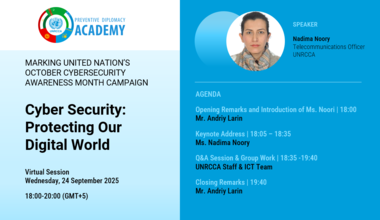SRSG Jenča's article " Regional Economic Cooperation in Central Asia: Challenges and Perspectives”
SRSG Miroslav Jenča's Article " Regional Economic Cooperation in Central Asia: Challenges and Perspectives" was published at “Afghanistan Reconnected: Regional Economic Security Beyond 2014” Report on the Abu Dhabi Consultations 2013-2014, prepared by the East West Institute in May 2014.
REGIONAL ECONOMIC COOPERATION IN CENTRAL ASIA: CHALLENGES AND PERSPECTIVES
The UN Regional Centre for Preventive Diplomacy for Central Asia (UNRCCA), through its mandate of preventive diplomacy, has been dealing with a number of challenges in the Central Asian region, in particular those that may pose a threat to regional peace and security. To effectively address challenges in the region, whether relating to the management of shared natural resources, terrorism, extremism, and cross-border organized crime such as drug-trafficking, regional cooperation is a very important component.
In landlocked Central Asia regional cooperation is particularly important. It would make sense economically, bringing the advantages of a larger market, allowing for better use of local resources, lowering the cost of production and transport, and increasing the competitiveness of local businesses. The region has an abundance of natural resources and the countries could benefit significantly from using them in an efficient and cooperative manner. Failure to cooperate may also bring risks to security and stability.
But in spite of serious efforts to make such cooperation happen, cross-border trade within the region in general is very modest. The development of infrastructure and communication links remains far behind its potential. The shared use of trans-boundary water resources causes serious tensions between upstream and downstream countries as long term sustainable arrangement has not been achieved yet. Cooperation is hampered by the countries’ different strategic visions of their future and their role in the region; historical grievances; and fear that regional cooperation could undermine their sovereignty and lead to or prolong a disadvantageous dependency on their neighbor(s). These factors are compounded by the strategic and economic interests of external players in the region.
Unfortunately, the lack of trust affects both bilateral and multilateral relations in Central Asia, particularly the relationship between upstream and downstream countries.
The lack of a “regional identity”, although not directly affecting cooperation among the countries, can also be seen to limit the potential for building trust and increasing contacts. While Central Asian states put a stronger emphasis on their own unique position and role the advantages of the region as a whole are underused.
At the same time, it is important to remember that despite the above mentioned factors, the Central Asian countries since gaining independence have managed to maintain peaceful and relatively stable relations, and that in the last decade the region has experienced solid economic growth. The regional potential to cope with serious security crises in a cooperative manner should not be underestimated. However, this potential can be seriously challenged even in medium term if more lasting arrangements are not found and negative factors grow.
The countries have tried to strengthen their economic ties through the establishment of various regional organizations. The Protocol of Five Central Asian States on a Common Market was signed at the Tashkent Summit in January 1993. The International Fund for Saving the Aral Sea (IFAS), comprising all the five Central Asian countries, was established in the same year. Kazakhstan, Kyrgyzstan and Uzbekistan set up the Central Asian Economic Union (CAU) a year later. Interstate presidential and prime minister-level committees and the Central Asian Bank for Cooperation and Development were created. In 1998 Tajikistan joined the CAU, that after changes including of its name was finally merged into the EurAsEC (EurAsian Economic Community), putting the idea of a Central Asian regional community on hold. In 2008 Uzbekistan suspended its activities in EurAsEC. The efforts to establish functional regional structures of economic cooperation in Central Asia have so far failed. The only exception is IFAS, which sees different levels of engagement by its five member states and which also struggles to meet expectations.
The challenges to regional cooperation in Central Asia also impact on how the countries engage with Afghanistan. The countries share deep concerns over the potential developments in Afghanistan, notably the possible deterioration of the security situation there and how this could impact on Central Asia. Security concerns, such as the threat of terrorism, religious extremism, drug trafficking and other forms of organized crime are also factors that lead the countries to display a cautious approach to closer economic cooperation with Afghanistan. At the same time, while the above-mentioned security threats should provide a strong incentive for closer cooperation between the five countries to jointly tackle these threats, the countries have selectively preferred to seek better protection of their interests through broader structures like the Shanghai Cooperation Organization (SCO), the Collective Security Treaty Organization (CSTO) with its Collective Rapid Deployment Forces, and the Commonwealth of Independent States (CIS).
With regards to economic cooperation with Afghanistan, the Central Asian countries are engaging on a bilateral or trilateral basis, without pursuing a common Central Asian approach. To give a few examples, Kazakhstan has allocated 50 million US dollars for the education and training of Afghan students. Uzbekistan has built a railway line from Hairaton to Mazar-e Sharif in Afghanistan, provides electricity for Kabul and is a key partner in the “Northern Distribution Network”. Turkmenistan is a strong promoter of the development of the TAPI project (Turkmenistan-Afghanistan-Pakistan-India natural gas pipeline). It has also increased the capacity of existing electric transmission lines to Afghanistan and plans to build new ones. The construction of a railroad to connect Turkmenistan, Afghanistan and Tajikistan has started in Turkmenistan. Tajikistan and Kyrgyzstan, with the support of the World Bank, promote the CASA-1000 project (transmission of electricity from Kyrgyzstan and Tajikistan to Afghanistan and Pakistan). Both countries are very interested in the development of their transport and communication links with and through Afghanistan, in particular railways. Tajikistan also supplies electricity to Afghanistan and actively supports cross-border trade between the two countries.
Despite the currently fragmented regional interaction both within Central Asia and with Afghanistan, developments in Afghanistan can bring an additional impetus to regional cooperation. There is a common understanding among the Central Asian countries that economic cooperation with Afghanistan is of vital importance for the stability and sustainable growth of the region as a whole. With Afghanistan more engaged in the economic processes of the countries of Central Asia, chances of attracting foreign investments and providing economic opportunities will increase for the entire region.
The potential for closer regional economic cooperation is highest in the fields of energy and infrastructure, as these areas are of primary interest for the Central Asian countries and would be difficult to develop purely on a bilateral basis. Stable energy transit and trade requires regional cooperation mechanisms and multi-layered political, technical and commercial linkages. There is a growing understanding in Central Asia that with a more stable and developed Afghanistan in the future, the efficient and fair distribution of water resources in the region would become even more crucial.
Infrastructure and communication links would also benefit from increased regional cooperation. The development of Afghanistan as a transit country is an idea that has received a lot of attention from Central Asian countries. Two major transit corridors (the North-South Corridor connecting Central Asia with Pakistani ports and the East-West Corridor connecting Central Asia with Iranian ports) could be developed through Afghanistan. The development of these two corridors could result in improved and diversified connectivity across the broader region and impact positively on both employment opportunities and production capacities.
Different regional frameworks, such as the Istanbul Process, RECCA (Regional Economic Cooperation Conference on Afghanistan), SPECA (the UN Special Programme for Economies of Central Asia), and CAREC (Central Asia Regional Economic Cooperation Programme) could support regional economic cooperation in a complimentary manner. CAREC, as an Asian Development Bank (ADB) supported initiative, has a main advantage due to its financial resources and implements a number of cross-border infrastructure projects. With regards to SPECA, its strength lies in the improvement of border-crossing procedures and transport-data harmonization in the region, while RECCA serves as a coordination body of economic activities related to Afghanistan and Central Asia. WB has offered various alternatives on how through regional cooperative approach to cope with seasonal energy shortages in Central Asia.
The Istanbul Process has also significant potential, as it includes not only the economic and security aspects of regional cooperation, but also focuses on removing political constrains to effective regional cooperation. As mentioned above, these constraints in Central Asia are particularly important. The Istanbul Process could become a political platform or an umbrella, under which concrete regional projects, including those mentioned above, are promoted. However, it is essential that the process has reliable funding for its projects and does not simply devolve to only providing formal reporting on already existing (mainly bilateral) activities.
The UN Regional Center for Preventive Diplomacy has actively supported both bilateral and regional approaches to enhance cooperation in the region as the best conflict preventive measure. UNRCCA is a partner of counter-terrorism confidence building measure of the Istanbul process focusing its activities on the implementation of the Global UN Counter Terrorism Strategy in Central Asia. It has facilitated a Joint Plan of Action on the implementation of the Global Strategy adopted in November 2011.
The Memorandum of Understanding between the United Nations and the Executive Committee of the International Fund for Saving the Aral Sea on cooperation signed in the UNRCCA building in Ashgabat in 2009 provides a solid basis for mutual support and interaction. The Regional Center has used its convening power to offer a needed platform for regional meetings on use of shared water resources in the region with Afghanistan as a frequent participant.
The Regional Center has been actively engaged in supporting economic cooperation through earlier mentioned RECCA and SPECA initiatives. Not less important in this respect is our cooperation with regional organizations such as SCO, CIS, OSCE, EU, ECO, CSTO as well as with International Financial Institutions notably the World Bank.
Finally, while promoting regional economic cooperation, it is important to keep in mind that cooperation is not a goal in itself. The main objective is to achieve security and stability, long-term development and economic prosperity in Central Asia including Afghanistan and the broader region.
 UN
UN





